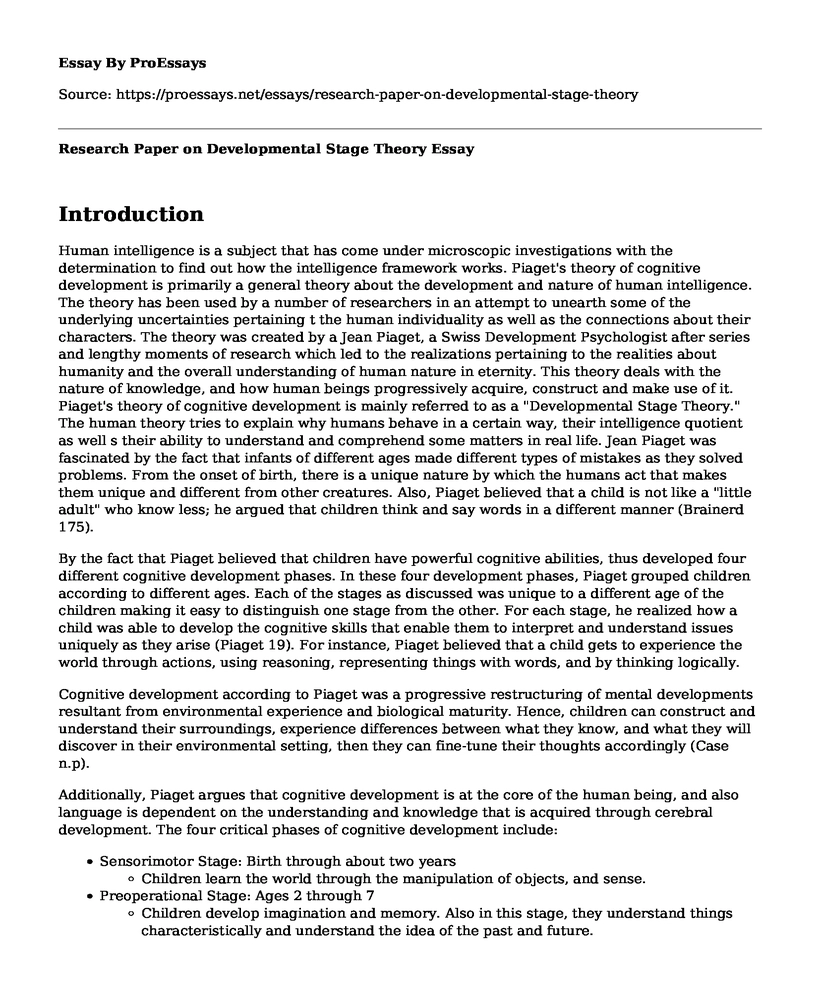Introduction
Human intelligence is a subject that has come under microscopic investigations with the determination to find out how the intelligence framework works. Piaget's theory of cognitive development is primarily a general theory about the development and nature of human intelligence. The theory has been used by a number of researchers in an attempt to unearth some of the underlying uncertainties pertaining t the human individuality as well as the connections about their characters. The theory was created by a Jean Piaget, a Swiss Development Psychologist after series and lengthy moments of research which led to the realizations pertaining to the realities about humanity and the overall understanding of human nature in eternity. This theory deals with the nature of knowledge, and how human beings progressively acquire, construct and make use of it. Piaget's theory of cognitive development is mainly referred to as a "Developmental Stage Theory." The human theory tries to explain why humans behave in a certain way, their intelligence quotient as well s their ability to understand and comprehend some matters in real life. Jean Piaget was fascinated by the fact that infants of different ages made different types of mistakes as they solved problems. From the onset of birth, there is a unique nature by which the humans act that makes them unique and different from other creatures. Also, Piaget believed that a child is not like a "little adult" who know less; he argued that children think and say words in a different manner (Brainerd 175).
By the fact that Piaget believed that children have powerful cognitive abilities, thus developed four different cognitive development phases. In these four development phases, Piaget grouped children according to different ages. Each of the stages as discussed was unique to a different age of the children making it easy to distinguish one stage from the other. For each stage, he realized how a child was able to develop the cognitive skills that enable them to interpret and understand issues uniquely as they arise (Piaget 19). For instance, Piaget believed that a child gets to experience the world through actions, using reasoning, representing things with words, and by thinking logically.
Cognitive development according to Piaget was a progressive restructuring of mental developments resultant from environmental experience and biological maturity. Hence, children can construct and understand their surroundings, experience differences between what they know, and what they will discover in their environmental setting, then they can fine-tune their thoughts accordingly (Case n.p).
Additionally, Piaget argues that cognitive development is at the core of the human being, and also language is dependent on the understanding and knowledge that is acquired through cerebral development. The four critical phases of cognitive development include:
- Sensorimotor Stage: Birth through about two years
- Children learn the world through the manipulation of objects, and sense.
- Preoperational Stage: Ages 2 through 7
- Children develop imagination and memory. Also in this stage, they understand things characteristically and understand the idea of the past and future.
- Concrete Operational Stage: Ages 7 through 11
- Children become conscious of external events, and feelings other than their own. They become less selfish and understand that their thoughts, feelings, and beliefs are not shared by everyone.
- Formal Operational Stage: Ages 11 and older
- Children can use logic in problem solution, viewing the world around them, and for their future (Piaget 13).
Works Cited
Brainerd, Charles. "The stage question in cognitive-developmental theory." Behavioral and Brain Sciences 1.2 (1978): 173-182.
Case, Robbie. Intellectual development: Birth to adulthood (Developmental psychology series). New York: Academic Press, 1985.
Piaget, Jean. "Piaget's theory." Piaget and his school. Springer, Berlin, Heidelberg, 1976. 11-23.
Cite this page
Research Paper on Developmental Stage Theory. (2022, Dec 08). Retrieved from https://proessays.net/essays/research-paper-on-developmental-stage-theory
If you are the original author of this essay and no longer wish to have it published on the ProEssays website, please click below to request its removal:
- Contrast of Two Theoretical Perspectives on Human Development
- Essay Example on Social Issue - The Effect of Divorce for Young Generation
- Human Development Paper Example
- Our Relationship With the Environment Essay Example
- Essay Sample on Development of Human Society
- The Emerging Clash of Civilizations Essay
- Essay Sample on Gen Z: Realistic, Independent & Fiercely Embracing Diversity







